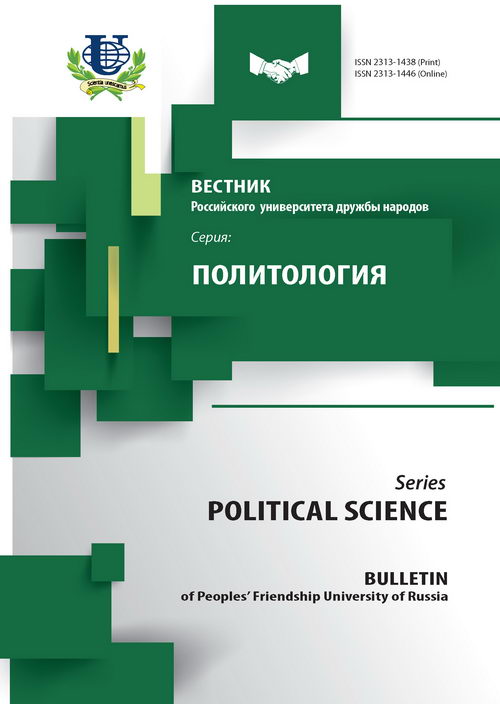«Естественный уровень образования» как фактор стабильности политического режима. Часть II
- Авторы: Иванов ВГ1
-
Учреждения:
- Российский университет дружбы народов
- Выпуск: № 1 (2012)
- Страницы: 35-56
- Раздел: СТАТЬИ
- URL: https://journals.rudn.ru/political-science/article/view/8881
- ID: 8881
Цитировать
Полный текст
Аннотация
В статье представлена гипотеза о растущем влиянии системы третичного образования на стабильность политического режима в ряде современных стран. Для раскрытия механизма этого влияния автором предложено понятие «естественный уровень образования», отражающее оптимальный с точки зрения избегания социальных потрясений баланс отношений между рынком труда и системой образования. Автор полагает, что стабилизирующая функция системы третичного образования обусловлена ее ролью специфического регулятора рынка труда и способностью включать в себя миллионы молодых мужчин, предоставляя им занятие на длительный срок. Под воздействием политики государства эта стабилизирующая функция может быть гипертрофирована и даже достигать экстремума - т.е. становиться контрпродуктивной. Статья имеет междисциплинарный характер, находясь на стыке политологии и экономики. Автор использует ряд методологических положений теории человеческого капитала и вводит понятия «образовательная пирамида», «образовательные пузыри», «образовательные ножницы» и др.
Вторая часть статьи содержит в себе case study, где в качестве примеров рассматриваются события в США 1940-х - 1960-х гг., а также ситуация в Тунисе и Египте до «жасминовой» и «твиттерной» революций 2011 г. Основное внимание автор уделяет во многом уникальному положению системы третичного образования России с начала 1990-х гг. до настоящего времени.
Вторая часть статьи содержит в себе case study, где в качестве примеров рассматриваются события в США 1940-х - 1960-х гг., а также ситуация в Тунисе и Египте до «жасминовой» и «твиттерной» революций 2011 г. Основное внимание автор уделяет во многом уникальному положению системы третичного образования России с начала 1990-х гг. до настоящего времени.
Ключевые слова
Об авторах
В Г Иванов
Российский университет дружбы народовКафедра сравнительной политологии; Российский университет дружбы народов
Список литературы
- Белковский С. Россия-2020: бескрайний огород, а посередине - нефтяная вышка. Экономические гуру Мау и Кузьминов планируют отбросить нас в доиндустриальную эпоху // Особая буква. - 10.05.2011. URL: http://www.specletter.com/ekonomika/2011-05-10/3/ rossija-2020-beskrainii-ogorod-a-posredine-neftjanaja-vyshka.html#video
- Белогрудова Н. Молодежная безработица в России выше, чем в мире // Деловой Петербург. - 27.08.2010. URL: <http://www.dp.ru/a/2010/08/27/Molodezhnaja_bezrabotica_v>
- В России вдвое сократится количество студентов. - 03.01.2010. URL: http://lenta.ru/ news/2010/01/03/fursenko
- В России так неоправданно много вузов, что их бы хватило на весь Китай, уверен Медведев. - 24.04.2008. URL: <http://www.newsru.com/russia/24apr2008/vyz.html>
- Волков С.В. Трагедия русского офицерства. - М.: Центр-полиграф, 2002.
- Высшее образование: повестка 2008-2016 // Эксперт. - 2007. - № 32 (573).
- Голдман Д. Интернет-пузырь в ближневосточной политике // Asia Times Online // Око планеты. - 16.02.2011. URL: http://oko-planet.su/politik/newsday/62161-internet-puzyr-v-blizhnevostochnoy-politike-asia-times-online-kitay-gonkong.html
- Долгов Б.В. «Взрыв» в арабском мире: внутренний и внешний контекст // Перспективы. - 15.04.2011. URL: http://www.perspektivy.info/oykumena/vector/vzryv_v_arabskom_mire_ vnutrennij_i_vneshnij_kontekst_2011-04-15.htm
- Занятость и безработица в Российской Федерации в январе 2011 г. (по итогам обследований населения по проблемам занятости). URL: http://www.gks.ru/bgd/free/b04_03/ IssWWW.exe/Stg/d01/37.htm <http://www.gks.ru/bgd/free/b04_03/IssWWW.exe/Stg/d01/37.htm>
- Интервью с Г. Дерлугьяном / Быков П., Гурова Т. Капитализм для всех // Эксперт. - 2011. - № 9.
- Капелюшников Р.И. Человеческий капитал России / Публичная лекция // Междисциплинарный лекторий «Контекст». - 11.11.2010. URL: http://www.contextclub.org/events/ y2010/m11/n512010.
- Капелюшников Р.И. Эволюция человеческого капитала в России // Отечественные записки. - 2007. - № 3. URL: http://gtmarket.ru/laboratory/expertize/2007/807
- Карпенко О.М., Бершадская М.Д., Вознесенская Ю.А. Показатели уровня образования населения в странах мира: анализ данных международной статистики // Социология образования. - 2008. - № 6.
- Коротаев А.В., Зинькина Ю.В. Египетская революция 2011 г.: структурно-демографический анализ. URL: <http://www.politstudies.ru/extratext/text/issue2011A.htm>
- Коротаев А.В. Молодым нечего терять. Каким странам угрожает собственная молодежь. - ФОМ. - 10.05.2011. URL: http://fom.ru/globe/43
- Корчагин Ю.А. Российский человеческий капитал: фактор развития или деградации? - Воронеж: ЦИРЭ, 2005.
- Кошмар на улице вузов. - 21.06.2010. URL: http://lenta2012.ru/pulsblog/86572_ koshmar-na-ulice-vuzov.aspx
- Мирзаян Г. Первая арабская // Эксперт. - 2011. - № 3.
- Обследование населения по проблемам занятости населения. Ноябрь 2005 г. - М.: Росстат, 2006.
- Прилепин З. Молодежь к выходу на пенсию готова / Terra Tartarara: Это касается лично меня [эссе]. - М.: АСТ: Астрель, 2009.
- Салтыкова М. Российское образование - экстренные вызовы // Риа-новости. - 24.05.2011. URL: http://strategy2020.rian.ru/g8_news/20110524/366068974.html
- Соколов М. Спрос на образовательные услуги и экономические стратегии: почему дипломы перестают быть «рыночными сигналами», и что с этим делать? / Публичная лекция // Междисциплинарный лекторий «Контекст». - 16.12.2010. URL: http://www.contextclub.org/ events/y2010/m12/n47 <http://www.contextclub.org/events/y2010/m12/n47>
- Статистика высшего образования. - 28.11.2007. URL: http://statistika.ru/obraz/2007/11/ 28/obraz_9416.html
- Структура безработных по уровню образования / Обследование населения по проблемам занятости населения, II квартал 2011 г. // URL: http://www.gks.ru/bgd/regl/b11_30/ Main.htm
- Успехи высшего образования в динамично развивающихся странах. URL: <http://www.uis.unesco.org>
- Фишер С., Дорнбуш Р., Шмалензи Р. Экономика. - МГУ: ИНФРА-М, 2008.
- Цифры системы образования. - 30.05.2005. URL: http://www.finmarket.ru/z/anl/ anlpgv.asp?id=383375 <http://www.finmarket.ru/z/anl/anlpgv.asp?id=383375>
- Шумпетер Й. Социология интеллектуалов // Капитализм, социализм и демократия. - М.: Экономика, 1995.
- Образованное бедное поколение // Взгляд. - 5.10.2005. URL: http://www.vzglyad.ru/ society/2005/10/5/8904.html <http://www.vzglyad.ru/society/2005/10/5/8904.html>
- Education at a Glance: OECD Indicators - 2007 Edition. URL: http://www.oecd.org/ document/30/0,3746,en_2649_39263238_39251550_1_1_1_1,00.html <http://www.oecd.org/document/30/0,3746,en_2649_39263238_39251550_1_1_1_1,00.html>
- Education at a Glance: OECD Indicators - 2007 Edition. - Table A1. URL: <http://www.oecd.org/document/30/0,3746,en_2649_39263238_39251550_1_1_1_1,00.html>
- Education at a Glance: OECD Indicators - 2009 Edition. - Table A1. URL: http://www.oecd.org/ document/24/0,3343,en_2649_39263238_43586328_1_1_1,00.html#4
- Education in Egypt. URL: www.wikipedia.org
- Education in Russia. URL: www.wikipedia.org
- Education in Tunisia. URL: www.wikipedia.org
- Ministry of Education and Training of Republic of Tunisia. The Development of Education. National Report 2004-2008. URL: http://www.ibe.unesco.org/National_Reports/ICE_2008/ tunisia_NR08.pdf
- Sabirianova K. The Great Human Capital Reallocation: A Study of Occupational Mobility in Transitional Russia. - EERC Working Paper No 2K/11. - Moscow: EERC, 2001.
Дополнительные файлы















